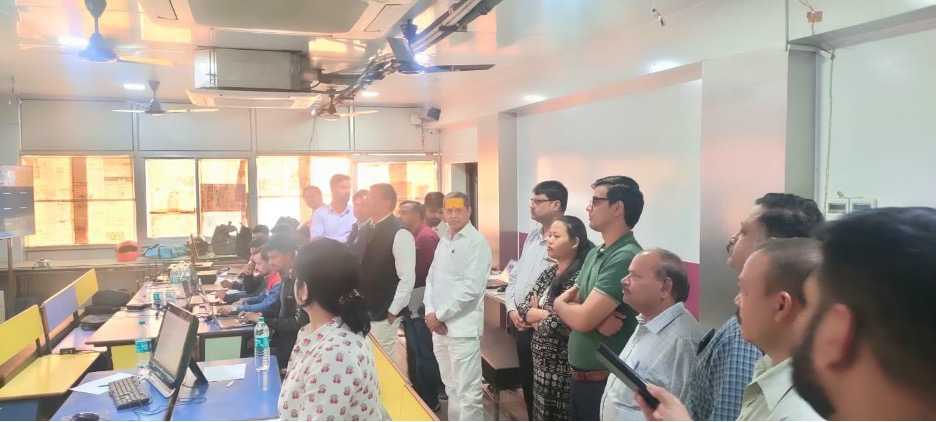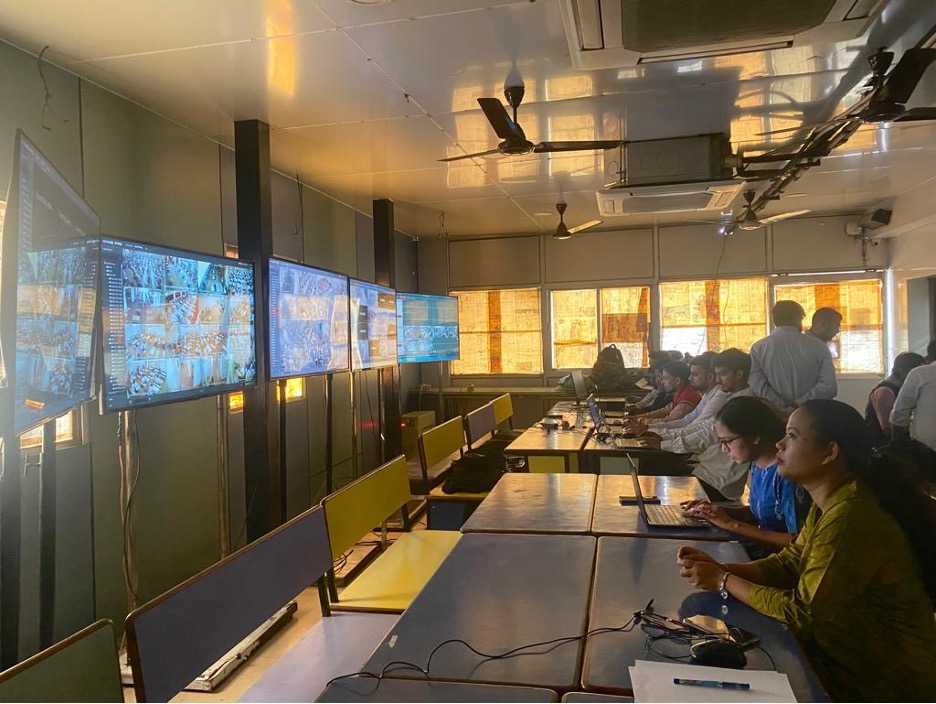In the dynamic landscape of healthcare, where ensuring the highest standards of competence and integrity among medical professionals is paramount, the Government of Uttar Pradesh came to a stark realization. It recognized the urgent need to improve the quality of healthcare professionals being produced within the state, acknowledging that the current standards were far from satisfactory and required immediate attention. This marked the launch of Mission Niramaya in May 2022, a visionary initiative aimed at making Uttar Pradesh a hub for quality nursing and paramedical professionals. Deepanshu Singal, part of the Niramaya team, wrote a detailed account of the mission in an earlier blog, highlighting its objectives, strategies, and remarkable outcomes on the occasion of the program completing a year in May.
Central to this mission's success is the comprehensive transformation of nursing and paramedical assessments process i.e. examinations and driving probity in the healthcare sector. In this blog, I will delve deeper into the successful implementation of key reforms that played a vital role in ensuring probity in the examination process, paving the way for a future of high-quality nursing and paramedical professionals in the state of Uttar Pradesh (UP).
The Pre-Reform Challenges
Prior to the reforms, nursing and paramedical examinations in UP were riddled with multiple inefficiencies and malpractices. Institutes conducted exams independently without external supervision, leading to rampant cheating, students clearing without writing exams, and invigilators being engaged in unethical practices. This dire situation led to the emergence of low-quality nursing professionals who were ill-equipped for their roles and were often employed at meagre salaries. The consequences were grave, as under qualified nursing professionals struggled to meet the demands of an ever-evolving healthcare industry.
Furthermore, the difficulties faced by the state in filling nursing and paramedical job vacancies due to a lack of quality candidates, underscored the pressing need for comprehensive reforms in nursing and paramedical exit exams. This urgency was further highlighted by the government recruitment drive conducted in January 2022, which brought to light the alarming state of nursing education within the state. The statistics from the drive revealed that out of an overwhelming 1,03,200 applicants competing for 4,500 vacancies, only 2,823 individuals managed to meet the minimum eligibility criteria. These findings served as a reality check that without immediate action, patient safety will remain at risk, and the development of a robust healthcare system in UP will be impeded.
Effective Interventions: Pioneering Probity
In response to the pressing need for transformation, the Department of Medical Education, Uttar Pradesh, with Samagra as the program management unit, embarked on a journey to institute a series of transformative interventions aimed at fostering fairness, transparency, and accountability in nursing examinations. Let us explore each of these interventions in detail:
- Live CCTV Monitoring: An audacious step forward, this reform mandated the installation of high-quality CCTV cameras in all exam centers across the state. Over 8000 CCTV cameras were installed, enabling real-time monitoring, preventing malpractices, deterring candidates from resorting to unethical means and thus instilling confidence in the integrity of the examination process.
Shri Alok Kumar, Principal Secretary, Department of Medical Education, Uttar Pradesh, during a visit to the control room to oversee the arrangements
- Surveillance through a Control Room: To fortify surveillance, a third-party vendor was hired to set up a dedicated control room. Officials from Uttar Pradesh State Medical Faculty, Samagra program team, and the vendor's team worked meticulously reviewing the live footage to promptly identify and flag any suspicious activity or irregularities. This proactive measure enabled swift detection of irregularities and immediate action against malpractices.
Control Room setup during nursing and paramedical exams in November 2022
- Flying Squads: To maintain on-ground supervision, agile flying squads comprising two members each were deployed in every district. In larger districts, an additional squad was deployed to ensure comprehensive coverage and effective oversight. The flying squads conducted on-ground observations, investigating flagged centers and taking necessary action. They also conducted surprise visits to exam centers, verifying and swiftly addressing any breaches to the integrity of the process.
- Securing Answer Sheets: To preserve the sanctity of answer scripts, stringent protocols were implemented. Answer sheets were packed and sealed under CCTV observation and dispatched to evaluation centers immediately after the exams. This meticulous process ensured fair evaluation, as answer scripts reached the evaluation centers without manipulation. The delay in the transit of answer sheets, which at times extended for months earlier, reduced significantly to a maximum of three days, leading to expedited result declarations and enhanced efficiency of the process.
Celebrating the Outcomes
The reforms yielded remarkable outcomes, emphasizing the significance of probity and signalling a shift towards excellence in nursing and paramedical examinations:
- Overhauled Pass Rates: With the implementation of the new examination framework, the pass rates for nursing exams plummeted from 90% to 61%, ensuring that only deserving candidates secured the qualification. Similarly, in the paramedical domain, the pass rate declined from 86% to 57%, reinforcing the first check to establish prominence of competent professionals in the healthcare workforce.
- Streamlined Result Declaration: The new examination process facilitated the timely declaration of nursing and paramedical exam results within an unprecedented six weeks from the conclusion of exams, and this news was covered by major media houses in Uttar Pradesh. This expedited result declaration empowered successful candidates to embark on their professional journeys promptly, providing them with opportunities for growth and specialization.
- Standardised Examination Process: The new model of the examination process established a precedent for a cohesive approach to taking exams. A comprehensive Standard Operating Procedure (SOP) document was created to guide every aspect of the examination process, ensuring consistency across exam cycles. This document standardized the examination process, cementing transparency and fairness as the pillars of the new era of nursing and paramedical exams in the state.
The Way Forward: Paving the Path for Excellence
The transformative journey in nursing examinations is an ongoing endeavor, with a resolute focus on advancing healthcare standards and nurturing competent professionals in Uttar Pradesh. Recognizing that theoretical knowledge alone is insufficient in the healthcare profession, efforts are underway to enhance the probity of practical examinations. This includes rigorous evaluation methods, and real-time monitoring using modern technologies. It will ensure that nursing and paramedical professionals in Uttar Pradesh are well-prepared to tackle real-world challenges. In addition, competency-based assessments are being introduced, aligning with global best practices to evaluate professionals based on their practical skills, leading to improved quality and enhanced career prospects.
Further, to streamline the entire examination process, a key module of Mission Niramaya focuses on digitizing examination operations, bringing efficiency, transparency, and accessibility. Building on the achievements and learnings, the future roadmap aims to bolster the examination process further and advance the quality of healthcare professionals in the state.
Conclusion
The successful implementation of comprehensive reforms in nursing and paramedical examinations in Uttar Pradesh has marked a new era of probity and accountability in the state's healthcare sector. The transformative measures have curbed malpractices, eliminated undeserved pass rates, and reduced result declaration timelines. Through the concerted efforts of Uttar Pradesh State Medical Faculty and all the supporting partners, the ripple effects of this transformation will extend well beyond examination halls to foster a culture of transparency and continuous improvement and in creating a robust system in the state that produces highly skilled nursing and paramedical professionals.


